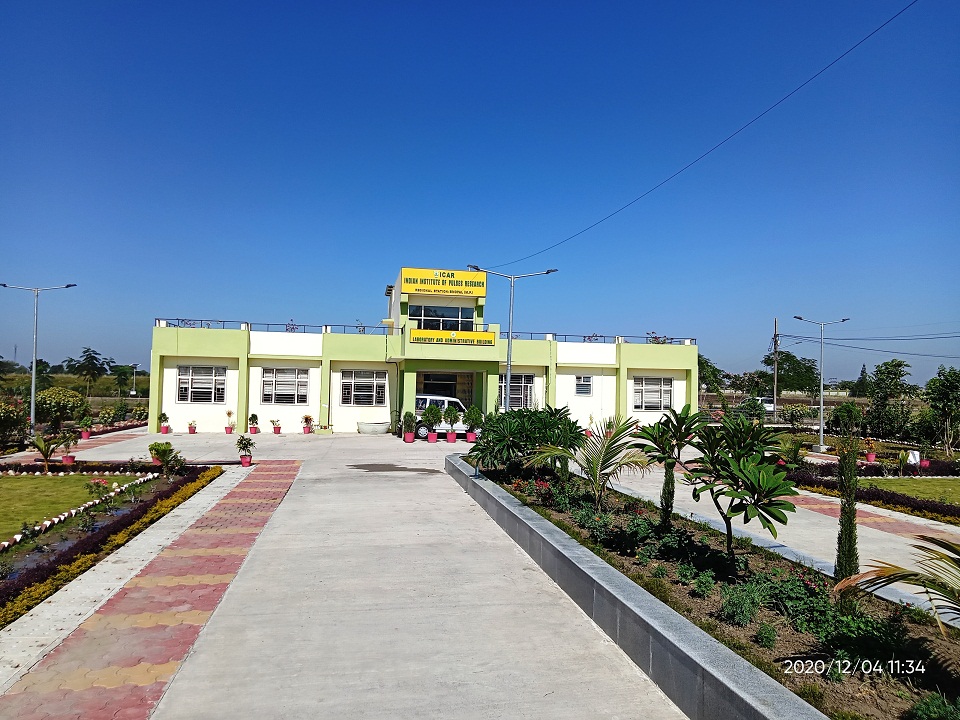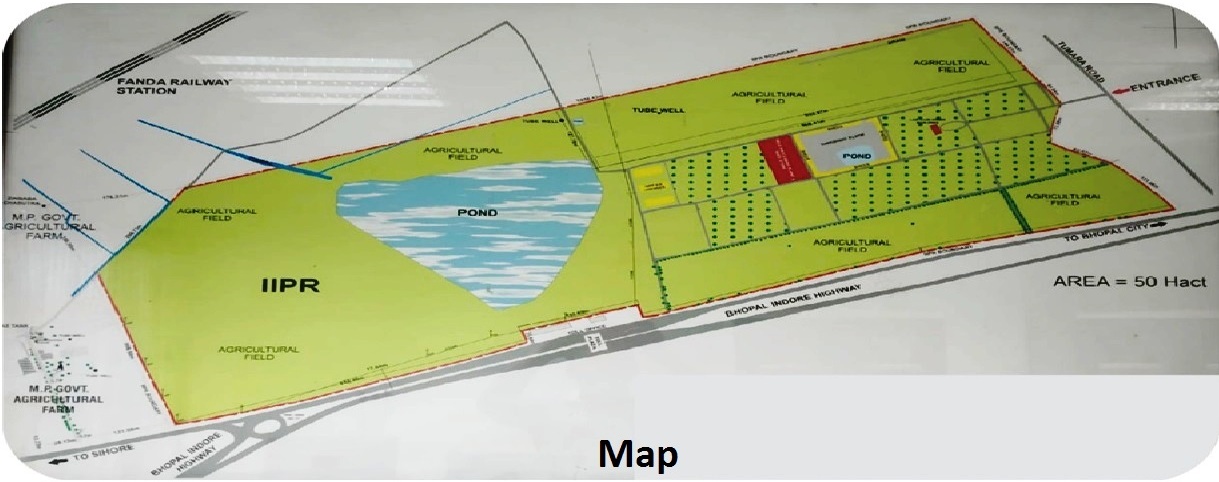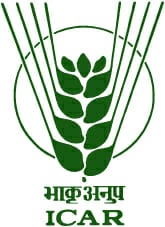ICAR-IIPR Regional Station, Phanda, Bhopal, Madhya Pradesh

Overview
ICAR- Indian Institute of Pulses Research, Regional Station Bhopal, Madhya Pradesh was established in 2013 with the objective of catering the needs of pulses growing farmers of central India. The regional station is located in the Phanda village on the Bhopal-Indore highway near toll plaza and adjacent to M.P. state Agricultural Farm. It is about 20 km from Bhopal railway station and 25 km from Bhopal Airport. The mandate of this station is to conduct strategic pulses research for Central India, quality seed production including nucleus, breeder and foundation seed, characterization and evaluation of germplasm, generation of high yielding breeding lines for central India, conducting field demonstrations and transfer of technologies. The station is also engaged in capacity building of officials of state department of agriculture and training of farmers.
Thrust Area
- To focus research on major pulses of central zone with emphasis on raindfed agroecosystem
- Genetic improvement of pulses for central zone with emphasis on terminal drought and heat tolerance and fusarium wilt resistance in crops like chickpea and pigeonpea
- Germplasm enhancement of important pulses of central zone with emphasis on germplasm evaluation, characterization and utilization in breeding programme through pre-breeding approaches.
- To produce breeder seed of major pulses varieties released for central zone
- To encourage farmers participation in the production of quality seed through seed hub
- To disseminate need base technologies suitable for the farmers of central zone through front line demonstrations and other programs
Mandate crops
Chickpea, pigeonpea, lentil, urdbean, mungbean, field pea and grasspea.
Map:

Layout Plan of RRS, Bhopal
Human Resource: as on 01.12.2022
| S. NO. | Cadre | Sanctioned | Filled | Vacant |
|---|---|---|---|---|
| 1 | Scientific | 07 | 05 | 02 |
| 2 | Technical | 04 | 03 | 01 |
| 3 | LDC | 01 | 00 | 01 |
| 4 | Driver | 01 | 00 | 01 |
| Total | 13 | 10 | 05 |






Technical Personnel:
| S. NO. | Name | Position |
|---|---|---|
| 1 | Mr. Amit Bhatore | Technical Assistant |
| 2 | Mr. Ritesh Pawar | Technical Assistant |
| 3 | Mr. Priyank Shrivastav | Technician |
Research Projects Under Operations
A. Institute Funded Projects |
|||
| 1 | Development of biotic and abiotic stress resistant superior varieties through integrated conventional and modern breeding approach in medium duration pigeonpea
|
PI: Dr. D. Datta
CoPI: Dr. SK Ghritlahre Dr. RK Mishra, Dr. Nidhi Kumari
|
|
| 2 | Plant Genetic Resources Pigeonpea component (Bhopal center)
|
PI: Dr. SK Ghritlahre
CoPI: Dr. Dibendu Datta |
|
| 3 | Enhancement of Kabuli chickpea for higher productivity, wider adaptability and better quality (Crop Improvement/ CI) | PI: Dr. Gitanjali Sahay
CoPI: Dr. Yogesh Kumar, Dr. Nidhi Kumari
|
|
| 4 | Plant Genetic Resources & their Utilization: Chickpea (Bhopal Center)
|
Dr. Archana Singh
|
|
| 5 | PGR Management and improvement of grasspea for low ODAP and high yield (CI) | PI: Dr. Archana Singh
Co PI: Dr. Neetu Singh Kushwah
|
|
| 6 | Genetic enhancement of mungbean for summer cultivation in Central India
|
PI: Dr. Surendra Ghritlahre
CoPI:, Dr. D. Datta Dr. Nidhi Kumari, and Dr.Revenaappa
|
|
| 7 | Prevalence and characterization of wilt & root rot complex diseases in chickpea and lentil and studies on seed-borne nature of chickpea and lentil wilt
|
PI: Dr. Nidhi Kumari
Co-PI: Dr. M.Akram, and Dr. Surendra Grithlahre
|
|
B. Externally Funded Projects
|
|||
| 1 | Characterization of chickpea germplasm resources to accelerate Genomics-assisted Crop Improvement
|
PI: Dr. Archana Singh
|
|
| 2 | Biodiversity for opportunities, livelihood and development (BOLD): Augmenting and up-scaling CWR derived grasspea elites for climate resilience in farmers’ fields (AUGER)
|
Project Coordinator: Dr. G.P. Dixit, Director, IIPR
PI: Dr Gitanjali Sahay CoPI: Dr. Surendra Ghritlahre
|
|
| 3 | Exploration and application of soil inhabiting and endophytic plant growth promoting bacteria including actinomycetes for biological management of soil borne diseases of lentil | Dr. Nidhi Kumari
Dr. Surendra Ghritlahre
|
|
| 4 | Enhancing breeder seed production for increasing indigenous production of pulses in India. | Dr. Dibendu Datta
Dr. Surendra Ghritlahre |
|
| 5 | Creation of Seed hubs for increasing indigenous production of pulses in India | Dr. Gitanjali Sahay
Dr. Surendra Ghritlahre |
|
Research Activities
- Strengthening of germplasm characterization, evaluation & utilization of pulse crops (chickpea, pigeonpea, lentil, mungbean, urdbean, grasspea).
- Improvement of kabuli chickpea for enhanced productivity, wider adaptability and nutritional quality.
- Genetic enhancement of pigeonpea for central zone.
- Improvement of grasspea for low ODAP and high yield.
- Genetic enhancement of summer mungbean for central zone
- Conduct of the national and international trials to identify superior genotypes for central zone
- Identification of trait specific donors of pulses
Significant achievements
Varieties Developed: Five varieties released and notified for Madhya Pradesh
- One Pigeonpea variety (IPA 15-06) was released and notified for Central Zone (CZ)
- Seven urdbean varieties (IPU 10-26, IPU 11-02, IPU 13-1, IPU 17-1, IPU 19-10, IPU 17-2, IPU 13-6) and 3 lentil varieties (IPL 534, IPL 341, IPL 342) were released and notified for Madhya Pradesh.
Chickpea
- Total number of cultivated chickpea accessions: 7500
- Wild accessions : 96 acc. (8 annual Cicersp) and derivatives
- Two hundred twenty two accessions were characterized and unique genotypes identified for extra-large seeds
- Validation of unique genotypes identified in CRP and DBT germplasm
Kabuli Chickpea
- Breeding materials generated
- Forty eight accessions were procured from FLRP Amlaha
- Five new crosses, 4 F2 population, 66 F3 SPS from 4 crosses, 76 F4 SPS from 5 crosses were generated
- One hundred fifty five entries in augmented design in which 3 lines were better than checks
- Two station trials were conducted in which 3 lines gave higher yield than checks
- Twelve genotypes evaluated for heat tolerance. 5 entries better than checks
Pigeonpea
- IPA 15-6 released and notified for CZ
- New F1 seeds were generated
- SPS selections were made in the breeding materials of medium duration pigeonpeaand their filial generations were advanced
- Shuttle breeding lines were evaluated and selected for generation advancement
- Conducted 3 station and one PTYtrials in which 2 superior entries each for mid-early and medium duration were identified.
- Conducted 3 trials for the evaluation of germplasm collected through germplasm exploration
- Conducted a PYT for the identification of promising wild derivatives.
- A multi-location trial for the screening of waterlogging tolerance was conducted and genotypes with less mortality under waterlogging stress were selected for further evaluation
- The passport data and seed of 16 genotypes of pigenopea collected from Sehore, Raisen and Narmadapuram districts of Madhya Pradesh were submitted to NBPGR and IC numbers were allocated to 14 accessions
- Six local germplasm were collected from Sehore district of Madhya Pradesh
- Maintained the biotic stress tolerant pre-breeding genotypes of pigeonpea
- Maintained 291 germplasm of cultivated pigenpea and 4 accessions of Cajanus scarabaeoides
- Identified 2 short height genotypes from the pool of wild derivatives
- Conducted trials for the identification of NIL pair for pod shattering genotype
Grasspea
- 532 Germplasm evaluated and unique genotypes selected for ago-economic traits
- 283 M3 families grown to evaluate and advanced to M4 generation
- One hundred ninety five single plant selections were made in M3 generation
- F1 and other generations were advanced
- Single plant selections were made from F2 and F3 generations
- New crosses made using L. cicera with cultivated genotypes and low ODAP landraces
- Crop wild relatives (CWR)-derived lines (21entries) conducted in alpha lattice design with 3 checks (Ratan , Prateek, Mahateora) in 3 replications. Entries: 31-GP-F3-S2, X2009-21-12S-16, X2009-02-12S-02, X2009-14-12S-23 and X2009-15-12S-27 yielded higher than the checks.
- South Asia panel 252 Land races from Amlaha with 3 checks (Ratan, Prateek, Mahateora) conducted in augmented design.
- 36 selected genotypes from FLRP Amlaha trial conducted in alpha lattice design with two replications. Entries: 31-GP-F3-S2, X2009-21-12S-16, X2009-02-12S-02, X2009-14-12S-23 and X2009-15-12S-27 were better yielders than the check Mahateora
- Germplasm accessions collected from exploration trip conducted in November last week 2023, toMungeli, Kawardha, Bilaspur and Raipur districts of Chhattisgarh, also 20 accessions procured from IGKV Raipur by MTA
Other research activities
- Wild pulse garden was created and 244 accessions of different wild species were collected and conserved
- Fusarium wilt sick plot of chickpea, pigeonpea and lentil are under development for race studies
Seed production
- 266 q breeder seed was produced
- 310 q quality seed was procured under Seed-hub project
Extension and HRD activities
- SC Sub Plan
- Three hundred twenty five farmers were benefited with the quality seed distribution of new varieties of Urdbean, Pigeonpea, Lentil, Chickpea,Fieldpea
- Knap sack sprayers were distributed to 100 farmers
- Micronutrient were distributed to 200 farmers
- Seed Bin distributed to 50 farmers
Farmers’ Visit
- One hundred forty four farmers and 02 officers from Chhattisgarh
- Twenty three trainees and 01 faculty member of ATMA programme from Raisen district
- Forty trainees and 01 faculty member of DAESI trainees
- Fourteen trainees and 01 faculty member of ATMA programme from Vidisha district
- Twenty three trainees and 01 faculty member of Agri-Clinic and Agri-Business Centre Scheme (ACABC) from Bhopal
Farmer-Scientist Interactions
- One day farmer-scientist interaction programme was organized
- Forty six farmers visited the station and interacted with the Scientists
Training
- Twenty seven farmers from RDO, Cuttack Odisha participated the training
- Fifty SC farmers from Awalikheda and Hinouti villages of Sehore district participated in the training titled “Cultivation of pulses for food security and sustainable agriculture” held at IIPR regional station Phnada, Bhopal
FLD’s conducted
- Forty FLD’s were conducted



